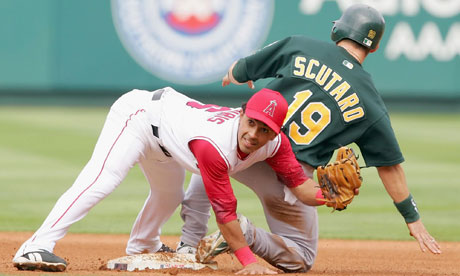
Like the cheesiest of summer teen movies, Michael Lewis's Moneyball tells a story of how the geeks and the freaks outsmarted the jocks. But rather than being set in a high school or summer camp, Lewis's 2003 piece of classic reportage treads rather less well-explored ground: behind the scenes in major league baseball.
Baseball need defer to no sport in its claim to be the quintessential summer game. (Yes, yes, cricket. But while most of my childhood was indeed spent under an endlessly cloudless Swansea sky watching Glamorgan being pummelled by all-comers, there are equally vivid memories of freezing February nights listening on the radio as England were pummelled in all corners of the southern hemisphere.)
By contrast, baseball is a purely April-to-September affair, with October ball only for those heroes who make the play-offs. It's played on sunny days and balmy nights and the fact that I read Moneyball during a baking July on Long Island, with the reassuring burble of baseball radio commentaries mingling with the hum of cicadas and whoops of frat boys, surely added to its allure. But that said, relatively little of Moneyball actually takes place outdoors on America's fields of dreams. More often the focus is on airless and strip-lit offices, deep beneath the grandstands, where a new breed of nerdy and statistically savvy baseball executives attempted to overturn a century and more of received wisdom as to how the game should be played.
Lewis made his name as a writer about finance – or more accurately a writer about the personalities working in finance – with his 1989 debut Liar's Poker recounting his time as a bond salesman at Salomon Brothers. Last year his The Big Short provided the most entertaining and comprehensible explanation of the 2008 banking crisis. In a sense Moneyball is in this line, in that Lewis was first attracted to the story when he noticed that the unfashionable Oakland A's, despite operating on about a third of the budget of the New York Yankees and other big clubs, consistently outperformed much richer teams. What were Oakland doing to buck the market?
Historically, baseball coaches had valued athleticism. They still do. They would be mad not to. But did they overvalue it? From the bedsit and campus computers of maths students who played fantasy baseball – a game in which real on-field events are translated into points – came the heretical realisation that some players, while not as traditionally elegant or as fast or as strong as the standard model, were nevertheless highly effective in some important aspect of the game. Such was the weight of accumulated industry wisdom, and the size of the resultant blind spot that had built up over the years in the eyes of coaches and scouts, these players were significantly undervalued. The Oakland A's – led by their, inevitably, charismatic and maverick manager Billy Beane – were the first team to recruit stats experts to their scouting staff and so exploit this inefficiency in the market and demonstrate the subtitle of Lewis's book: "The Art of Winning an Unfair Game". Just how Oakland succeeded is a fascinating story: part thriller, part-family saga, brilliantly told. You do not need to know or care about baseball – though I defy you not to be smitten after reading the book – because like all good sports books, it is not really about sport, or even in this case about applied statistics. It is about people. Specifically the oddball group of irregulars Beane gathered together who emerge as Hogarthian eccentrics: the hitter so fat "if you put him in corduroys, he'd start a fire"; the pitcher whose action was so distorted that he regularly grazed his knuckles in the dirt as he threw. Nick Hornby said he understood only one word in four of the baseball talk, yet still called it "the best and most engrossing sports book I have reads in years". Since the publication of Moneyball the Oakland personnel, and their ideas, have spread out across the league and their methods assimilated into mainstream thinking. The market corrected itself and the A's are again struggling against the weight of financial imbalance. But just as Billy Beane and his cohorts proved that all baseball stars having to play the same way "is as absurd as insisting that all writers should write like John Updike", Moneyball shows that a book about misshapen athletes and introvert statisticians needn't necessarily be excluded from the sand and suntan oil treatment. And, yes, it has just been made into movie slated for release this autumn starring Brad Pitt and Phillip Seymour Hoffman. I'm telling you now that it won't be as good as the book.

